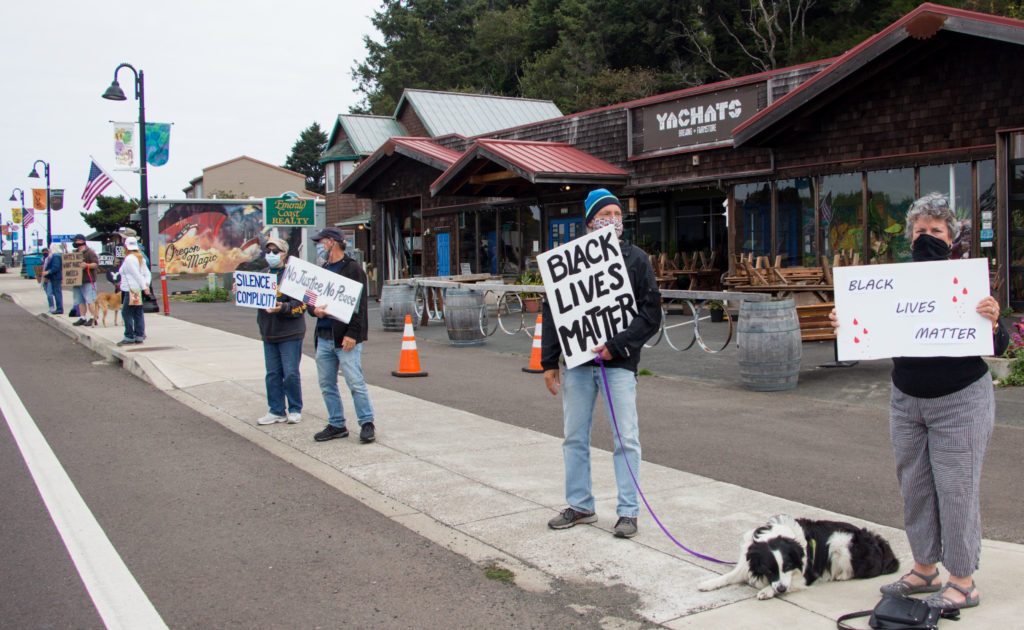
By QUINTON SMITH/YachatsNews.com
It’s 10 o’clock on a Saturday morning and for the 15th week in a row the protestors begin to quietly appear.
Holding signs, they take up positions along U.S. Highway 101 in downtown Yachats. It’s a mixed group. More old than young. More female than male.
But they all have one goal – for one hour each week they will hold signs that decry racism, discrimination, police brutality, and that Black lives matter. A few urge people to vote, especially against Donald Trump.
The number of protestors ebb and flow each Saturday. Some weeks there are 40; other weeks it jumps to nearly 100.
It’s not an organized group. Just a weekly Facebook reminder urging people to give up an hour of their Saturday morning.
There have been irregular protests for years along the highway through Yachats, but they end after a week or two. This one started May 30 following the killing of George Floyd, a Black man, in Minneapolis by a police officer on May 25. Demonstrators haven’t missed a Saturday since.
Signs are mostly homemade. Some have barely legible scrawls. Others display big, bold letters and artwork. On cardboard, on plastic, on a long stick, or something simple to hold.
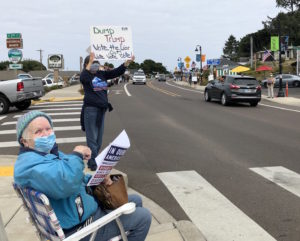
That the quiet demonstration in Yachats has kept going for more than three months is of little surprise. The town’s mostly retired residents have a very high education rate, incomes more than double Lincoln County’s average, and a reputation for being mostly open, liberal and progressive.
And while the town is vastly white, protestors say they want to stand up to racial injustices.
“Although Yachats is older we still care about things,” said Donna Bader, who was attracted by the town’s progressiveness when she moved two years ago from Laguna Beach, Calif. “Sometimes we’re the ones who have to speak out.”
Holiday traffic is streaming through Yachats on a busy Labor Day weekend Saturday. Protestors say there’s been a major change in response the past month — more honks and waves of support and fewer middle fingers.
“The positivity of the drive-bys are better,” says Maggi Lee, who comes down from Seal Rock to join the Yachats group. “A month or so ago it wasn’t.”
Why?
“Enough is enough,” says Dana Bleckinger of Yachats, who has attended all but two protests with Dooley, his border collie. “You think you’re at the low point but it keeps getting lower and lower.”
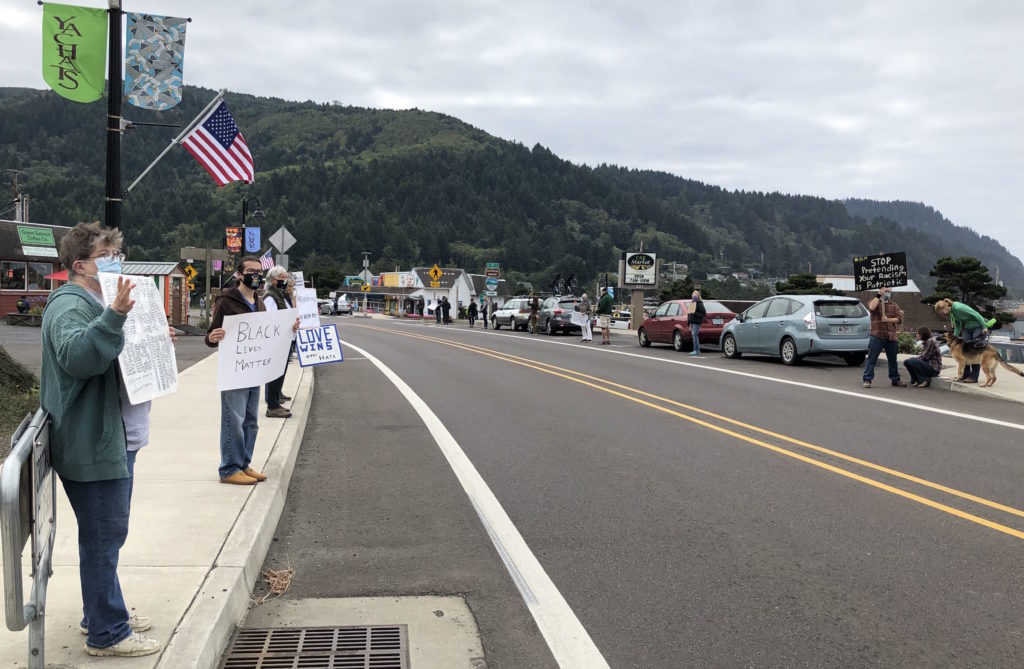
In their own words, Yachats protestors say why they demonstrate
Although some protestors are motivated by politics, many have personal stories as to why they stand along the highway holding a sign.
For Bader it was because a Trump-supporting uncle said protests don’t do any good. For Betty Groth it was learning than her long-ago farm family in Georgia owned slaves. For Dave Cowden and Sam DiMaggio, both veterans, it was their or their family’s experiences with prejudice and Trump’s reported slurs against people who served.
YachatsNews asked eight people Saturday to explain in their own words why they protest. Here are their stories.
Donna Bader, Yachats
When I first heard the phrase, “Black Lives Matter,” I thought I was being compassionate by responding that “All Lives Matter.” I have since learned how inappropriate my response was.
Yes, all lives do matter. But right now, we need to focus on systematic racism that Black people routinely suffer from before looking at curing other ills.
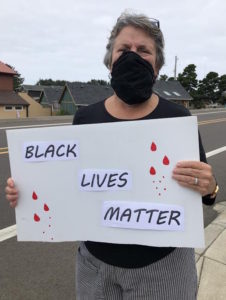
I was late to the party of protests. I didn’t think it made much of a difference until someone reminded me of the protests to end the Vietnam War. Protests can make a difference.
And it doesn’t matter that we have one or two Black people in Yachats, or even none at all, because we have to recognize that racism is a national problem and more often practiced by white people.
My uncle, an ardent Trump supporter, called me a few months ago and asked if I were protesting in Portland. I said no. He said “Good, it doesn’t accomplish anything.” My response was “It gives us a voice.”
After talking to him, I felt ashamed that I wasn’t out there with the rest of the protesters, or even in Portland. I thanked him for energizing me and I committed to come out to protest. I have tried to make it every week since that call.
I am out there because the time is right for it. We have had protests in the past but the momentum is building. I believe that people really do want to make this a better country, which means facing our history.
Sam DiMaggio, Eugene/Yachats
I grew up in very poor neighborhoods of southern California in the 1990s. I saw how police officers would treat people based on their skin color and react much differently if you weren’t white.
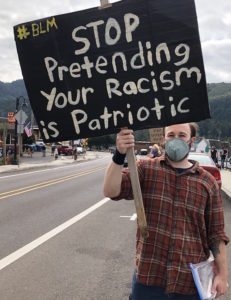
Before I got into high school my family moved to middle-of-nowhere Idaho. There I was harassed and called “N-word lover.”
I served in the U.S. Air Force for six years as an avionics technician. When I was stationed in Oklahoma City there was a cop who got in trouble for pulling over women and raping them. He served no jail time and was only suspended from the force.
I protest because there is systemic racism, sexism, and bigotry within our government, its law enforcement, and our culture. Unless we as the people address this issue we cannot be a free country.
Patriotism is not just supporting this country but making it better. That means those who fight for everybody’s right to pursue happiness are more patriotic then those who stand against it.
Maggi Lee, Seal Rock
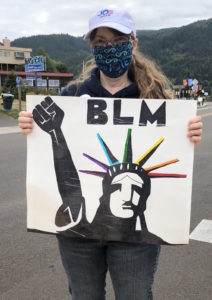
Being a woman and a pan-sexual, I have experienced moments of fear and hate throughout my life but none so violent as what we are seeing now in our society. We are all flesh and bone with beating hearts and I want to try to make this clear to our community, our state, and our country.
We all have sadness and happiness, life and death, hope and defeat in our lifetimes. Why is that so hard to understand?
I am very proud to be participating in a peaceful demonstration that has been going for 15 consecutive Saturdays to bring attention to the injustice rampant in our country.
Betty Groth, Yachats
There are several reasons I started joining the Saturday morning Black Lives Matter rallies in Yachats. One of the most meaningful reasons is related to an email I received in 2011 through the Ancestry website.
“My name is Keith Smith, I live in Detroit. In 1860 your ancestor JL Render (Joshua) owned a farm in Meriwether, Ga. My great-grandfather Andrew Render was born there in 1851. He was a slave and took the Render’s name. After slavery he continued to live in Greenville, Ga. He raised his family there where some of us remain. I send you my best.”
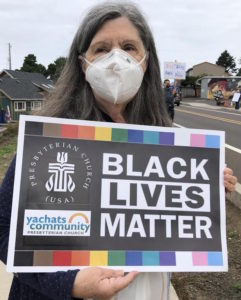
I was shocked. I knew my Georgia family owned farms but I never really thought of them “owning” people.
I went to work researching the name of Keith’s great grandfather, Andrew Render. I found the following information which I sent to him.
“Also, in the will of Joshua Lewis Render (Sr) in Wilkes County on April 1, 1817 probated Nov. 2, 1818, was the following. To his wife, Susan Dickie Render: 1. Negro slaves Simon, Jacob, Daniel, George, Lige, Andrew, Hannah, Celia, Charity, Bett and Beady.”
I immediately received this answer from Keith.
Dear Betty, Thank you for responding to my email. Your response was read with a warm-felt heart. The detailed information about the early years of my Great Grandfather’s life touched the heart and soul of every member of my family. You can rest assured that your email will be read by each descendant of Andrew Render. I will end this letter wishing you and your family all of God’s blessing and knowing that my family will be forever thankful. May God Bless You.”
I recently sent this email to Keith: “Dear Keith: As I’m sure you know, this coming weekend we will commemorate Martin Luther King’s “I Have a Dream” speech. I was reflecting on that speech and remembered your emails. I remember Dr. King saying, ‘I have a dream that one day on the red hills of Georgia, the sons of former slaves and the sons of former slave owners will be able to sit together at the table of brotherhood.’
Wouldn’t it be wonderful if the descendants of your great grandfather, Andrew, and my great grandfather, Joshua Render could all gather this weekend at a table on the red hills of that old Georgia plantation and celebrate our creator and the freedom He gave all of us.”
I feel like Keith Smith’s family is a part of my family. There was (and is) no racial division. However, I do feel a sort of inherited guilt. So, when I go to the Saturday rallies, it really is to stand up for the freedom and equality of my “family.”
Jonni Prince and Dave Cowden, Yachats

Prince: I am a 71-year-old white woman raised in a Midwest middle class, conservative family. I was raised to respect the government, the President, the military and the American flag.
I missed out on the protests of the 1960’s because I was living a sheltered life in the heart of the Missouri Bible Belt. I didn’t see how all that “radical stuff” pertained to me and my safe, protected life.
Fast forward to today’s America. I don’t recognize it. I am, and have always been, so proud to be an American and to benefit from the privilege that I assumed everyone enjoyed if they just worked hard and tried to live a good life. Follow the Golden Rule and “pay it forward” and you will be rewarded. I now realize that that truth is not the same for everyone. I’m sorry it has taken me so long to wake up to the inequities in our country. But I finally have. There’s so much more for me to learn.
I’ve been attending the Yachats’ protests for 15 weeks straight and will continue as long as it’s needed. I still have faith in our great country and in the ability of all of us to learn and grow and change. I’ll be continuing to raise my voice and speak up when I see injustice. For me, there’s no other choice. To quote Maya Angelou, “when you know better, you do better.”
Cowden: I will be 75 in the spring. In my lifetime, there has been a disturbing descent into intolerance of anything or anyone different than our proclaimed white superiority.
I protest in honor of three members of my family who are people of color and for my five adult kids who have known and lived with white privilege.
I am heartbroken that my generation will leave my kids, grandkids and future descendants a world that is so devastated by climate change, unending wars, political tribalism, police practices and politicians who will do anything to stay in power.
I protest because it seems to be the best way to get our leaders’ attention.
I am an Army veteran, 1966-69. The president is a disgrace in his berating of vets, active duty personnel and families.
I am a proud American but, now for the first time in my life, I am embarrassed. We can do so much better than this.
Dana Bleckinger, Yachats
I’ve decided to be a vocal ally to the people of color because I am sick and tired of seeing the oppression of anyone who isn’t a white male.
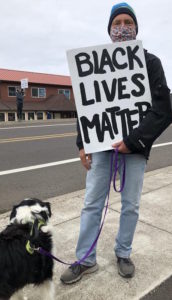
It has to stop. I wish for people to not get defensive when they see peaceful protesters holding Black Lives Matter signs, because people of color continue to experience systemic racism. We need to put ourselves in their shoes, and imagine what life is like for a person of color, or better yet, listen to their stories, their fears. Their voices need to be heard.
Another thing is to ask yourself, “Where is it safe to be Black?”
The answer is simple: “It’s not safe to be Black in this country.” They are not safe jogging down the street (even though I am); they are not safe in a cafe (even though I am); and, they aren’t even safe sleeping in their own bed (even though I am).
Systemic racism affects every aspect of their lives. It’s built into the very structure of our economy, society, education, and governmental institutions. It results from the inherent biases and prejudices from centuries ago, and it’s prevalent in the policies that continue today. It leads to discrimination in criminal justice, employment, housing, health care, politics, etc.
I march to lend my support to BLM. I march to bring awareness to the problems people of color face every day of their lives. Through these protests, if one person decides to question what they thought they knew, and listen to the voices of Black, brown and indigenous people, then I know standing on the streets of Yachats helped to effect change towards more awareness, tolerance, and hopefully equality and justice.
Holly Brandwen, Yachats
I am engaged in the weekly Yachats protests and many others like it because I believe what is going on in the U.S. government and environment is horrific and we need to make an immediate change.
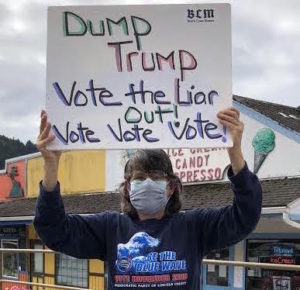
Donald Trump must be voted out as he is absolutely unfit and unable to lead this country and he carries blood on his hands for being responsible for the thousands of deaths due to the lack of leadership regarding the COVID-19 epidemic.
He has no concern for our environment and shows this by rolling back dozens of environmental regulations and allowing the land to be raped by oil mongers and vast corporations.
He will continue to make sure the 1 percent get richer and the rest of the country become poorer. There are so many areas he has destroyed or is planning to destroy.
Trump’s past actions and being advised when he first became president by a white supremacist shows us how he feels for people of color. He should never have been elected. He will destroy the last remains of democracy and decency this country has.
We must vote him out.



Thanks for including the stories of some of the peaceful protesters in Yachats. Thanks to them for making protest visible — and peaceful.